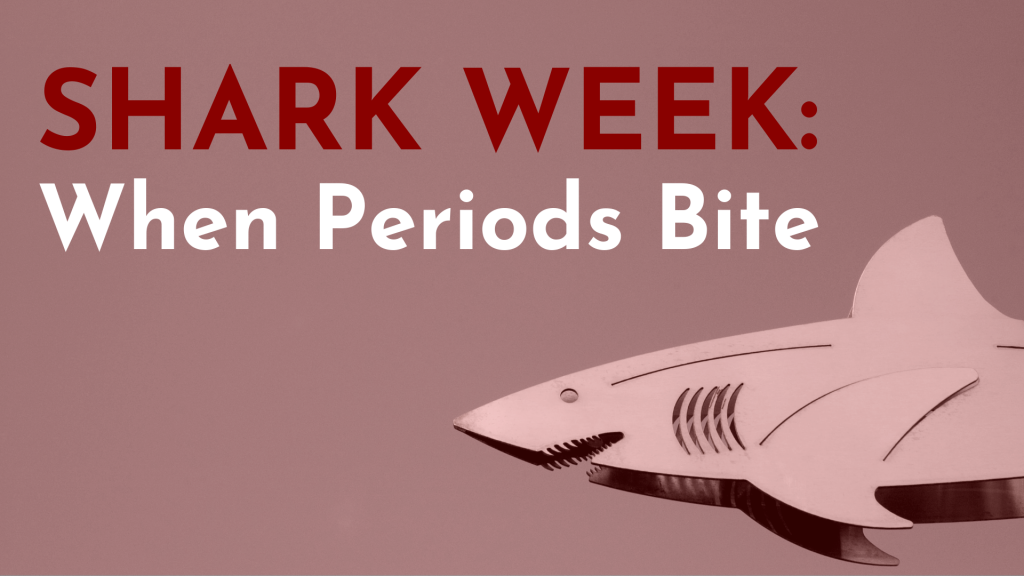June 2019: Shark Week

At Mabel Wadsworth Center, our interns are responsible for updating the bulletin board in our waiting room once a month. In case you haven’t had the chance to visit us recently, you can read about this month’s bulletin board topic here. This post is by our 2019 summer intern, Hannah Piecuch (she/her/hers), who comes to us from Agnes Scott College in Georgia thanks to the Civil Liberty & Public Policy (CLPP) Program’s Reproductive Rights Activist Service Corps (RRASC) Program.
July may contain the week-long Discovery Channel special program all about sharks, but “shark week” is also what many of us call our periods. It makes sense, since there’s often a bloody mess at the end of the week! However, there’s also a lot of stigma about both sharks and periods that ends up hurting both sea creatures and people who menstruate alike. While we believe that no one deserves shame or overly negative feelings toward their period here at Mabel’s, we also believe that the way everyone feels about their period should be up to them—whether your period makes you feel in sync with your body, makes you feel grossed out, causes feelings of dysphoria, or doesn’t make you feel much of anything, your whole range of feelings and experiences around your period are valid.
An additional note: notice that in this piece, we’re purposefully not using language that equates having a period with being a woman—this is because many transgender men and non-binary people have periods, but they aren’t women. Additionally, there are tons of women, both trans and cisgender, who don’t have periods, so suggesting that having a period is an essential part of womanhood causes harm because it doesn’t adequately describe everyone’s experiences.
When you get your period, it’s actually just one part of the hormone cycle that makes it possible for humans reproduce. There are many awesome online resources that explain the menstrual cycle in-depth (and our July bulletin board in our clinic illustrates it as well!), so we won’t spend a lot of time talking about it here. But at its most basic, the ovaries release an egg cell so that it’s available to meet a sperm cell if the person has unprotected penis-in-vagina sex. In the meantime, the uterus grows a lining of blood and other tissue for the purpose of being able to support a pregnancy if the egg cell does meet a sperm cell and implants in the uterus. If a pregnancy does occur, the uterus needs this lining, called the endometrium, to continue nurturing the
pregnancy, so that’s why pregnant people don’t get periods. But most of the time, no pregnancy occurs, so the uterus no longer needs this lining: it sheds the endometrium, as well as the unfertilized egg cell, in the week-or-so of bleeding that most people know as their period.
The biology behind having your period might seem kind of complicated, but the culture of shame and stigma around periods in the US is even more confusing. While we intentionally use language that gives voice to the experience of non-binary people and trans men that have periods, we can also acknowledge that American culture writ large still equates women with people who have periods, so misogyny shapes these negative social views of periods (and hurts non-binary and trans people in ways specific to their identities in the process). Periods are often exaggerated as gross, unsanitary, and causing hysterical reactions, but simultaneously, people who have periods are pressured to minimize any period pain and be as secretive as possible about anything related to them.
These pressures on people who have periods as a whole hurt people on an individual level. For example, when preteens are told that having a period means they can now have children because they’re becoming a woman, it can cause them to feel sexualized or reduced to their reproductive capacity—or if such a preteen is trans or non-binary, feelings around being objectified can compound with pain from being seen as a woman when they’re not one. Or a person who has really painful periods might assume or learn from experience that they won’t believed if they tell their healthcare provider about their pain, so they just suffer through disabling pain without ever getting compassionate help. Cultural norms around periods being gross can contribute to people who menstruate feeling like they have to apologize for their bodies, especially if they’re wanting to be sexual with cis men. It doesn’t help that the same stigma causes cisgender boys and men to know very little about periods and react squeamishly to any discussion of them, both a result and cause of ongoing period shame.
So what can be to help our culture have a more healthy relationship with periods? Much of feminism and social justice is centered around believing the experience of marginalized people, so listening to and believing people’s feelings around their periods—and creating space where they feel safe sharing them—is a crucial step. Talk about your period with anyone who will listen, especially people who rarely hear about menstruation, and seek to listen to those whose experiences with periods are different from their own. But before that, you can believe your own feelings, too, whether negative or positive, or intense or mild.
At Mabel Wadsworth Center, our client-centered, feminist approach to healthcare means that believing a patient is the critical first step to providing care. We work to eliminate shame and stigma because we know our clients deserve to have autonomy over the way they feel about their reproductive and sexual lives.
